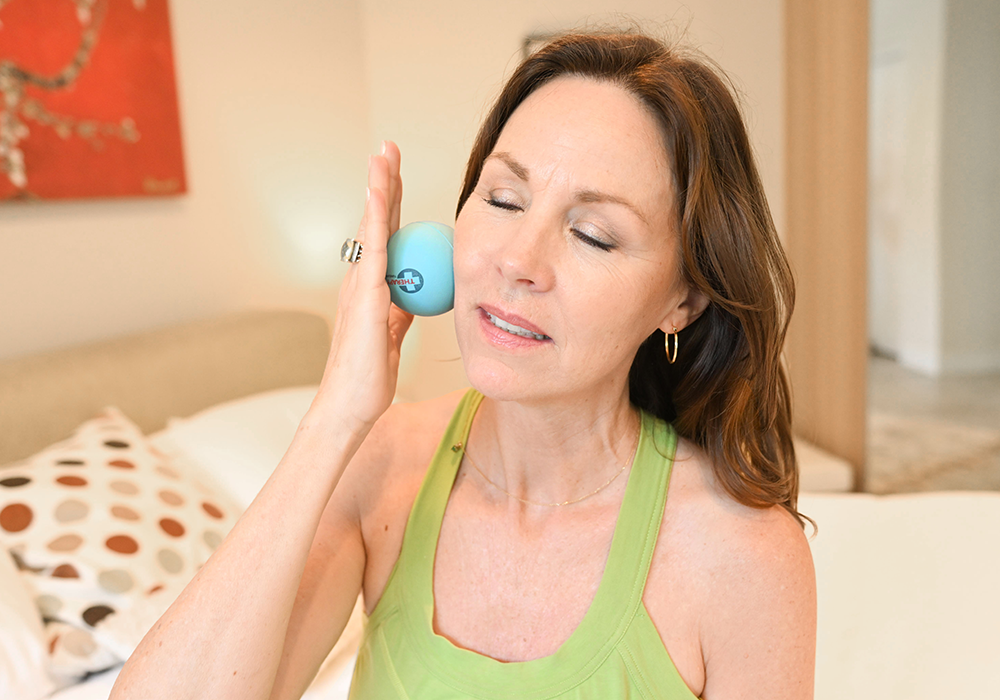
Does your day involve a lot of talking? Do you suffer from regular tension headaches, clicking in your jaw or neck pain that you can’t figure out? Chances are you are hiding a ton of tension in your two primary jaw muscles, the temporalis and masseter.
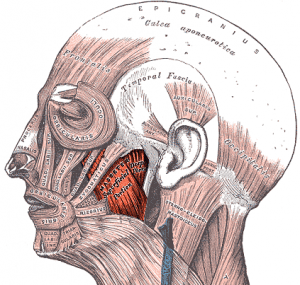
The masseter is one of the strongest muscles in your body relative to its size. It doesn’t get much rest either, as it works constantly anytime you talk or chew. If you grind your teeth or clench your jaw in your sleep (or during awake hours), the masseter and temporalis get even less rest, as they work stressfully around the clock.
The masseter runs from your zygomatic arch (the cheek bone) to the lower corner of your jaw, known as the mandible. The temporalis is appropriately named for its location – on your temple. It lays like a fan over the temporal fossa and inserts into a bony beak on your jaw, known as the coronoid process of the mandible. The primary action for both of these muscles is to elevate the mandible (aka close your jaw).
Like many young people in our country, I had braces as a kid. Part of my orthodontia treatment was to pull adult teeth in my mouth to make “room” in my jaw for an aligned smile. I was also a tongue thruster and through the use of retainers retrained my tongue to thrust on the roof of my mouth instead of behind my front teeth. As you can imagine, this completely rearranged my bite (as there were teeth in places they wouldn’t have been without intervention) and I hadn’t solved the issue of thrusting, just redirected it.
I never thought much of it until I became a full-blown body nerd and was waking up consistently in the morning with neck pain. No matter how hard I tried to reorganize my sleep arrangement, from different pillows to switching sides of the bed, I would still wake up with pain that began to radiate down into my shoulder. The unaddressed tension in my neck and jaw had come to a point where I couldn’t even bear the touch of my esthetician without wincing. I had discovered a body blind spot that I had been ignoring for many years.
Once I began to deal with my jaw pain and relax my jaw muscles before bed, my regularly occurring tension headaches and shoulder pain began to dissipate as well. The constant clenching of my jaw and thrusting of my tongue had created a cascade of effects that rained down into the joints below.
One of the first things I did was to stop constantly clenching my jaw. It was as simple as allowing my upper and lower teeth to separate slightly, without opening my mouth, every time I noticed that I was clenching. I also stopped incessantly thrusting and pressing my tongue into the roof of my mouth, and allowed it to relax as well. Just as realign my feet to parallel whenever I catch myself standing like a duck, I relaxed my tongue whenever I noticed thrusting. I was very surprised how often I caught myself doing this – but after many weeks, the new habit of a relaxed jaw finally took root.
Another stretch I began to do, suggested to me by fellow Yoga Tune Up® Teacher Elizabeth Wipff, was a tongue exercise that she learned from a vocal teacher. It is so simple, and yields great results. To do it, trace around all sides of your teeth with your tongue and then stick it out and hold in various directions. You may try to touch your nose, your left ear, your right ear, and eyebrows – just try to take your tongue in every possible direction. The first time I tried this, the stretch sensation went all the way down the back of my throat. In addition to my jaw, I had found another blind spot!
Come back on Friday for my favorite TMJ, tension headaches and jaw solutions with Yoga Tune Up® Therapy balls. These tried and true techniques have become daily practices, just as I brushing your teeth is.
Enjoyed this article? Read Help Relieve TMJ Syndrome With Yoga Tune Up®


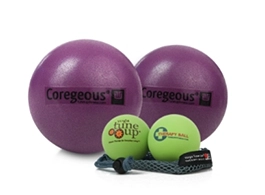
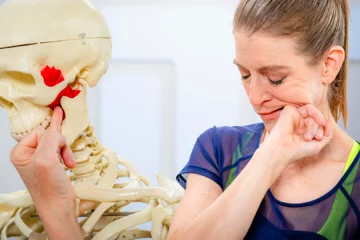
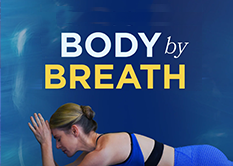



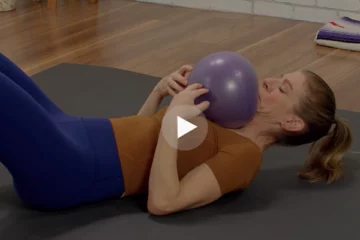
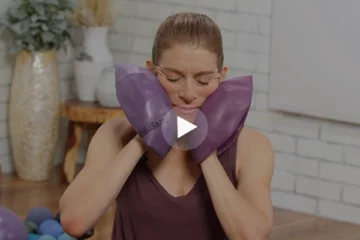


I did not realize the impact that dental implants would have in regard to jaw pain until I began to notice the tension on the left side of my jaw. Overtime, my teeth and upper jaw had begun to shift to the right side (the side of my dental implants) giving me a cross bite and pain all along my left side from the foot to the top of my head. My first sense of relief came from a well constructed bite plane, the second sense of relief was finding myofascial release techniques. Until now, I had not considered how talking could have an impact on jaw pain! Suffice it to say that as a Clinical Exercise Physiologist with a busy practice, I am talking a lot throughout the day! In the last two years, I have also had two separate bouts of laryngitis which is new for me…I have to think this is somehow connected! The reading of this blog has been timely! It is now time to further explore these messages from my body and find the best way to support it back to health.
I clench my jaw and grind my teeth at night…and feel it in my neck when I wake up in the morning. I enjoyed the tongue exercise as it revealed how much tension and release my tongue needed! My job requires that I talk a lot so silence is appreciated and adding some self care to my jaw and tongue will be helpful too.
This is a wonderful description of the masseter and temporalis muscles and how they can go awry. I also have some jaw and facial pain/headaches related to constantly talking, clenching teeth and orthodontia. I saw a specialist physical therapist who works only with tongue/jaw/airway issues and we worked on appropriate tongue posture – how the tongue should naturally rest on the roof of the mouth without strain. Such a fascinating area to learn more about and bring into our awareness. Thank you for your insights about your own pathway to unraveling jaw tension.
I’m amazed at how over-looked the face muscles are in most of my yoga class experiences, yet how effective and helpful it can be to focus on releasing tension in the face.
I’m inspired to incorporate a couple of minutes of facial stretches, and bringing awareness to how natural it is to hold tension in the masseter and temporalis to my own life, and then to share this with my students.
I also had no idea I was clenching my jaw at night until the dentist pointed it out to me. I imagine it’s going to be a challenging thing to retrain in my sleep but I’m hoping what I do when I’m awake will translate into my sleep. Going to start by bringing more awareness to my teeth/tongue position during the day, using the therapy balls to roll out over-worked muscles and work the tongue and trying some positional exercises. Thanks!
As someone who has suffered from TMJD pain, I really appreciate this article! I feel like the TMD is often overlooked – but since it’s the closest joint to our brain, it is extremely important in relation to nerve input! I had fibromyalgia-like pain that was alleviated with TMJ muscular work and balancing.
Great tip I suffer from TMJ and migraines just tried the little trick with my tongue and found instant relief.
This is so helpful. I grind my teeth at night and carry a lot of jaw tension. I am definitely going to try these tongue exercises and pay more attention to letting my teeth come apart.
Oh my goodness. Thank you for this article. I do not have tension headaches, but I am constantly clenching my jaw. I am going to be conscious of the slight separation of my teeth and work on those tongue exercises. I am hoping it will receive some of the daily tension I feel in my jaw.
This article about tongue movement opened up a whole new area to add to ways to help others. I recently and my first time ever felt some pain in my left masseter and got our my YTU balls. I did this a couple days in a row and haven’t had tightness or pain sense. It is so cool to have to work through your own issues and discover solutions that meet your need. Nothing like first hand knowledge. This is a keeper.
This article opened up a whole new area to add to ways to help others. It is so cool to have to work through your own issues and discover solutions that meet your need. Nothing like first hand knowledge. This is a keeper.
Great post! I have not thought about the complications of having braces in my mouth but it did encourage me to thrust my tongue. In addition to watching my duck feet and tight shoulders, I have now to watch how I hold my tongue. Thanks
Interesting connection with the orthodontics. Also, this is spot on advice. Thank you. “It was as simple as allowing my upper and lower teeth to separate slightly, without opening my mouth, every time I noticed that I was clenching.”
Loved reading your story and learning more about the masseter and temporalis. I’ve recently started rolling these muscles with YTU balls and have found tremendous relief. I’m a singer and these muscles often have a way of tightening up and distorting resonance. I am fascinated to realize these problems may have originated way back when I had braces in high school! Also the connection between jaw and neck pain is something I’d like to explore further.
Sometimes my jaw pain can get so bad I feel as thought it’s my JAW thats running my body, not my brain. I’m happy to hear that other people have experienced the same thing. I had braces and head gear growing up, both really changed my alignment. I think that one of the things dentists should mention is the AWARENESS you should have after creating such a huge change within your everyday opening, grinding, tongue placement patterns. As we know, it takes years to create our habits and fixing them might take even longer.
So interesting! As someone who also had braces but continues to experience jaw pain, I find this fascinating. I had never considered this before – I am also guilty of thrusting my tongue and grinding my jaw at night. Clearly I had redirected my habit, instead of addressing it!
Yoga Tune Up has helped immensely. I find when I have the chance to roll my TMJ, sternocleidomastoid muscle, temple and levator scapula, I experience the most relief. I also have tried the contract-relax method with my jaw; widening and holding for 10 seconds, then relaxing and allowing it to finally “turn off.” Lastly, I find a good way to relax jaw is to say the word “Boston.” The end position of the word is the natural position of our jaw.
I love how there’s a description of the habit that is negative (clenching the jaw) for the 2 main muscles of the jaw, the temporalis and masseter, and a description of the habit you can create for yourself (unclenching your jaw when you notice it, etc.).
Thank you for sharing your story. I have a friend who has shared that he grinds his teeth at night. You have given me an opportunity to maybe shed a little more light on the subject by simply asking if he wore braces as a kid and then offer one of the ball rolling techniques. I know how easy it is to get caught up in the “why do I do this?” And hopefully this will catapult him to believing that he can change it! Thanks so much!
OMG! This has helped me so much! I have been having so much pain in my jaw, head, and shoulders. I love the technique from the voice coach. I should have thought of that. But am so glad that you reminded me of it. I will definitely put that to use. Thank you so much!
Who knew jaw pain and shoulder pain could be connected? I never think consciously about what my teeth, jaw, and tongue are doing all day long. I grew up knowing I would grind my teeth at night, but never knew how to help it, especially since I had no idea how to stop it on my own. I look forward to working on my jaw and relaxing my tongue! Thanks!
Glad I found this article to support my own research. I can relate to the jaw and in my case face pain due to teeth clenching. After a tooth extraction I experienced jaw and face and neck pains I thought were due to an infection but ended up being tight muscles. My research pointed towards the masseter, sternocleidomastoid and temporalis . And just like your article said, less clenching, sleeping with mouth guard and some ball therapy took the pain away in few days!
I’m going to start doing this tongue exercise/stretch while I drive in my car. Curious to see how it affects my headaches and neck pain.
Thanks for your article. I found it helpful.
I can’t wait to practice the tongue exercise you shared. I concentrate on my posture like aligning my feet to be parallel and trying to stand up straight, but thank you for reminding me the importance of not forgetting about my jaw. My jaw clicks and when I recently went to the dentist I was told that I grind my teeth in my sleep and therefore my teeth are chipping. After reading your post, I have some new tools I can use to keep some room between my teeth and to relax my tongue in my mouth. Maybe I won’t have to to get that invisalign reatment after all!
i also had braces as a kid and have recently just begun to realize how that forcing of the perfect smile created tension in my jaw over the years. Thank you for the tongue exercise, I will continue to practice that one!
Très intéressant de voir le lien avec la mâchoire et les tensions de notre corps. C’est un bon rappel pour nous dire que tout notre corps est un ensemble qui est sensé être en harmonie mais aussi que la langue est un muscle à ne pas négliger. Je me souviens que durant une période de stress j’avais tendance à serrer la mâchoire et je ressentais des tensions au cou. Merci pour l’exercice de la langue 🙂
Silence is it’s own exercise. Done with awareness it helps to relax to main organs, the tongue and the mind. Will Rogers suggested: “Never miss a good chance to shut up.” Great advice..
I clench my jaw when I massage my clients. The yoga tuneup exercises have helped me tremendously.
Thank you!
Oftentimes when I get tension headaches, TMJ will also begin hurting as if my wisdom teeth are shfting around. 10 minutes rolling the YTU balls around my jaw and neck and doing some exercises I learned from a vocal coach really help to alleviate the headache. And I have found these symptoms to be really common in many of my friends. This knowledge definitely needs to be spread! Thanks for the write up!
Such a wonderful reminder that my tongue is a muscle too and needs to be exercised properly for proper function. Plus who doesn’t want an excuse to stick their tongue out like a child? I often wonder about what braces have done to my internal soft tissue of the face & head, as it moved the bones in the jaw (the teeth) and probably even moved bones of the connecting skull? I love how you built a new beneficial habit by simply using conscious awareness.
I am so grateful to have come across this blog. Not only have I been a teeth grinder since a very young age, had a poor experience with braces, but I was also hit really hard in the jaw during a car accident about 6 years ago. Coincidently this is also when my jaw clicking and tension headache met their climax. I suffered for many years, altered what I ate, tried every brace there was; doctors frequently told me I would need my jaw broken and reset in order to be pain free. The first time I rolled my masseter and temporalis was the first true rest my jaw had experienced in years! I literally had to get up off the floor to look in the mirror because my entire right side of my face felt as though it had shifted compared to my unrolled side. I now keep a “face” ball in my bag at all times, because for me I have to do frequently. I really enjoyed the tongue exercise and am looking forward to your next post!
Interesting – I hadn’t thought of my orthodontic treatment being CONNECTED to jar clenching and my holding my tongue to the roof of my mouth. I always assumed these were negative habits I picked up on my own that the dentist rightfully criticised me for (sort of – thy make money every time I see them, so maybe they’re happy about it).
I’ll definitely be experimenting with your awareness exercises and checking our your TMJ routine!
Very well written and thanks for the anatomy lesson Alex! I often have neck pain and it helps a lot to release my scapular muscles but it has not fully resolved. I grind my teeth at night, so perhaps my masseter and temporalis are involved. I’ll check it out with my tune up balls. Also, someone asked above if hip and jaw tension are related. I’m not sure about hips but tension in your jaw is related to being able to relax and open your sphincters, specifically your cervix during birth. If your jaw is clenched against the discomfort, you usually dialate more slowly. My midwife had me do “horse lips” to help me relax, which also made me laugh (also helpful for dialation.) it’s all connected!!!
The masseter has become a favourite muscle of mine. I used to clench my jaw and although I don’t anymore I still wake up with a clicky left side sometimes. I love to roll my jaw before bed now, my face feels so relaxed. Thanks for that tongue exercise too, I will have to add that to my routine.
Oh my goodness, I just tried the tongue exercise and it’s intense! I’m a jaw clencher and tongue thruster and constantly practice relaxing my jaw and tongue. Although I’ve made progress, I still feel like I’m holding residual tension and gripping in the muscles, especially in the back of the tongue and also when I sleep. Any suggestions for getting those last threads to untie?
Today the anterior part of my neck was so strained and I think it might be because of what you mentioned – that the tongue is thrust forward and pressed to the roof of my mouth – that seems to be the place where it constantly lives! The masseter too seems to be strained from perhaps clenching the jaw a fair amount – especially at night or if I am focussing on something. I’ll be sure to bring awareness to these areas now daily and use the balls to gently roll out the masseter, the scalenes and the sternocleidomastoid!
I find it fascinating that tension in the masseter could cause pain in the shoulders but at the same time it totally makes sense. I’ve recently begun rolling out the masseter using the original sized Yoga Tune Up Therapy balls and my sleep is deeper. Im looking forward to seeing the effects it may have on my shoulder/neck pain.
It’s also been a blind spot for me until my dentist had to do fillings on my lower molars because of all the clenching I did as a result of stress and grinding of my teeth during my sleep. My stress has reduced significantly since I changed careers, but I still catch myself clenching from time to time. I’m sure some of my headaches can be attributed to my clenching and grinding. Definitely going to start using yoga tune up balls to help with these issues!
Thanks for the shout-out to the introverts! 🙂 Actually, there were two points that I really appreciated about this post: (1) the power of mindfulness, as evidenced by changing your behavior each time you noticed it and how that changed the behavior pattern over time, and (2) your mention of Elizabeth teaching you something useful from her vocal background, which just goes to show how open and accepting YTU is. It doesn’t matter where it came from – what matters is that it works.
That is a great revelation to me!! I grind my teeth ALOT during sleep and clench my teeth/jaw during the day. I knew they needed attention and that giving the TMJ some loving would help- but wow! I did NOT know that it could be related to the neck pain I experience when I wake up. I am definitely going to incorporate these tips into my practice and see how that work. Can’t wait to tips out!!
Alexandra, yes! I used to grind my teeth horribly to the point where my husband kindly requested that I wear a mouth guard. I did that for about three nights and then became so disgusted with it, I threw it out. Bandaids of all sorts end up pretty yukky and do nothing to address the underlying cause of the problem they are covering up, or in this case, silencing. I had to figure out another solution. Right around that time, I went to a student of Glenn Black’s and she did a lot of painful Body Tuning work on my jaw. At the end of the session, I felt like I had a completely different neck and shoulder region, in addition to a different face. It was extraoridinarily transformative. Since then, I focus a lot on releasing tension in my jaw with the YTU balls, and, as you mentioned, I can find release there by working on my shoulders – the other end of my mental stress echo chamber. A less direct and curious connection I’ve also noticed is that when I roll my buttocks I experience immediate jaw tension relief, as well!
So glad I saw this post! just last week I was relieved from tightness in my jaw and clinching after using the Yoga Tune Up balls on the massete 🙂 I was so happy to sleep much more soundly after what I believe has been a couple of months that I had been feeling this. And as a singer I thing It wouldn’t hurt to get back to my tougne excersises. Thank you Alex and Elizabeth.
I also have discovered a body blindspot here! Without even noticing, I am constantly bringin my hand to the right side of my jaw and rubbing the tension held there. I need to get to the bottom of it and plan on using the balls to do so. I also had braces at the age of 20 and although y teeth look straighter, my bight has been off since. The jaw tension was the price to pay for straight teeth!
Okay, Alex and Elizabeth, I look silly but the tongue exercise got me into my masseteur in a new way. I have enjoyed massaging my face with the balls to relieve the tension. I have known cerebrally that my jaw tension and neck pain and shoulders are all connected. But now I KNOW, because I can feel it in my body.
I am a teeth clenched and have been working the zygomatic arch, temporalis, masseter route. The tongue series seems nice. I will be trying it tonight after my brush.
Thank you Alex, and for sharing Elizabeth’s tongue routine which I am doing as I type this. As a Structural integration practitioners we do an intra oral series releasing the masseter and ptyregoids, often also peeling away layers of holding and repression of words unsaid.The physical and emotional release is often substantial. Thank you for sharing your experience and tools.
Thank you for the (in)sight to this wonderful connectioin to talking. I’m reflecting (silently) to myself how much I express myself verbally. As a yoga teacher and a student of life – I experiance and then share those experainces. I have a sacred day inwhich I purposfuly retreat from people and for the most part verbal expression. I experiance teeth grinding and jaw tension and now I can also consider how talking may be contributing to this. As I read the article I did the tounge exersizes and what do you know…another area brought out of the dark and into the light.
I will pass this along to my son, he has been clenching and grinding his teeth while sleeping for years. Fantastic tongue exercise, I was surprised at the sensations I felt.
I’ve noticed a reduction in the sensitivity of my teeth since becoming conscious of jaw clenching habits. Rolling out the masseter has also been a big help. I think I tend to take the muscles in my face for granted. It had never occurred to me to do tongue exercises, thanks for the suggestion, Alex!
I like the advice about releasing tension on the jaw. Lots of us tend to tense the jaw when we are exerting ourselves like when we do a difficult yoga pose. When holding a pose I bring my attention back to the breath and then notice my jaw and if it is tense I release it. The position of your jaw is very connected to the position of the pelvis. Many of us who grind our teeth tend to have unl-evel pelvises with one ASIS and or PSIS higher than the other. Dr. Steve Swidler of Medicine Wheel Dentistry in Tucson, a dentist and a cranial osteopath, and Maria KaliMa, a yoga therapist, have done a lot of work in this area.
I too had a profound experience the first time I stuck my tongue out for an extended time in a yoga workshop! It was also a great release for my anterior neck. As a craniosacral practitioner I know that braces can immobilize some of the cranial bones which can also lead to headaches! I’ve had many sessions to help with jaw and head pain, but I must say the pin, spin and mobilize work on the masseter is the bomb!
I can definitely relate to this, as I do wake up with jaw pain, and also from grinding my teeth at night, and also from teaching strength training. My lower molars have been grinded down to the fillings and I do take notice of my under bite, and be mindful of how
I clench my jaw at night when I sleep.
As Dental hygienist and yoga teacher I loved this and will certainly use this information.
After a car accident with whiplash, I developed really big problems with TMJ. I also had major problems with sleeping and clenching of teeth. Once I worked on those trigger points and could relax those muscles, TMJ went away. Pressing against the roof of my mouth gentle with my tongue really helped retrain those muscles as well.
Thanks for some great simple reminders for how to release tension in the jaw. Chewing gum also increases the tension. Before my hip replacement I was playing with the connection between gliding my hip flexor gently from side to side and the connection to gliding the jaw and found that there was virtually no movement in either. Has anyone else noticed a connection between the freedom in the jaw and hips?
I don’t think I clench my jaw or thrust my tongue while awake, but I do wear a bite guard at night due to grinding my teeth while sleeping. I will try the tongue exercise and will be interested to read about the ball exercises, too.
Thanks for sharing! I’ve been grinding my teeth for years but it’s only recently that I’ve noticed the neck tension and associated headaches. The Tune Up therapy balls have been great, but I’m also excited to try this new tongue stretch.
Great post. I can definitely relate to the jaw and neck tension (although fortunately it’s not bad enough to give me headaches – hoping I can reverse the trend using these techniques before that becomes an issue). I really like what you said about the importance of awareness, and that when you’re trying to realign the body it takes time and effort to undo years of bad habits.
Thank you, Alexandra. Separating the upper and lower teeth slightly with mouth closed, and exploring with the tongue both inside as well as outside the mouth are indeed great for voice.
I am generally fairly quiet so this makes me feel better about it. I also tried the tongue exercise. That is probably a body blind spot for anyone who has never tried it!
Your post reminds me to check in to these areas–the masseter and temporalis. I have a number of students with profound mobility limitations, and finding areas of tension that they can address (massage with fingers) for themselves is very empowering. The tongue exercise is new to me. We will give it a whiril!
Thank you for putting this on my radar! We seem to attend to the jaw so little in yoga – ironic since we keep a lot of stress there… hmmm???
Some jaw problems are a result of the body attempting to correct a forward head posture, by retracting the jaw (unfortunately not an effective strategy). Sliding the skull back, without tilting, and then being aware of relaxing the jaw, several times through the day can gradually remind the body where it could be and hopefully bring some relief.